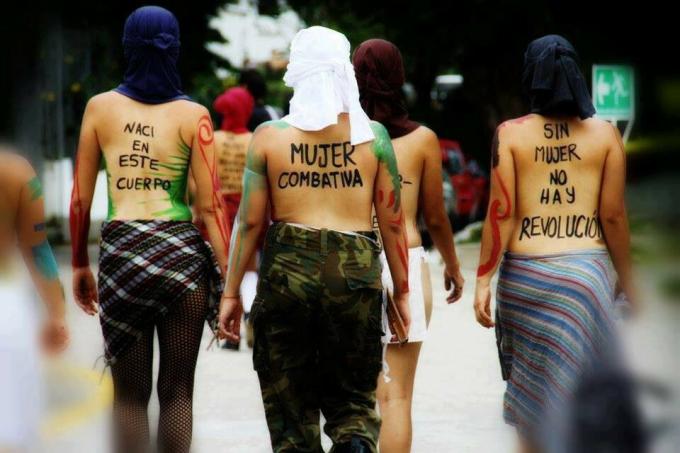Types of feminism and its different currents
Feminism is a set of highly varied social and political movements. Partly because of its long historical trajectory and partly because of the diversity of ideological traditions What is in it, there are many types of feminism, some of which not only propose different strategies of pursuing their goals, but also have different objectives.
Next we will see the different main currents of feminism.
Main types of feminism
This classification of currents of feminism must be understood as a simplification, since there are many types of feminism and here only the main branches appear.
1. First wave of feminism
The first wave of feminism, which appeared between the late nineteenth and early twentieth centuries, focused on the search for formal equality between men and women. That is, they fought for the right to vote for women, non-discrimination against women in the laws and possibility that they too could access the property instead of being simple administrators of the domestic economy.
The type of feminism of this time is fundamentally liberal, and was based on the principles of the Enlightenment. It was a movement that started from the idea that there was no valid reason to break the principle of equality defended by the intellectuals of the Enlightenment and to discriminate against women.
Thus, the perspective of analysis of the reality of the first wave of feminism started from individualism: the problems of women were not seen as social, but as attacks on her individuality and her ability to accumulate property private.

2. Second wave of feminism
Starting with the second wave of feminism, which occurred between the 60s and the 90s, the number of types of feminism is further diversified by adopting influences from postmodern philosophy and for moving away from the individualism of liberal feminism.
In this new feminism it is considered that the underlying problem of which it is wanted to end at the root (hence the denomination "radical") is a social and historical phenomenon, that is, something that must be attacked from a collectivist. That makes the influence of postmodern ideas join the dialectic inherited from Marxism.
Two main branches appear in this generation of feminism: difference feminism and equality feminism. Both, however, are grouped into a category known as radical feminism, from which it is interpreted that the nature of the Discrimination against women does not depend on specific legal forms but is part of a historical system of economic, political and political oppression. cultural call patriarchy.

2.1. Equality feminism
From the feminism of equality the objective is that women can reach the same status that only men occupy, among other things. In addition, it is understood that gender is a social construct that has historically served to convey oppression of women through gender roles artificially assigned at birth.
Consequently, equality feminism emphasizes the idea that men and women are essentially human beings, regardless of imposed genders. However, this does not mean that in practice the immediate goal of equality feminism is equality itself; As it is understood that it starts from an imbalance between the sexes, positive discrimination can be defended in some areas, for example, as a temporary measure. For example, a minimum of female representation may be required in parliaments.
Historically, equality feminism has been heavily influenced by MarxismSince, unlike difference feminism, it focuses on material aspects of the most basic human needs while starting from an analysis focused on social phenomena.
2.2. Difference feminism
From the feminism of difference the goal of ending the oppression of women is set without taking male status as a reference. From this type of feminism the idea of vindicating feminine values (revised so that they are not dictated from a masculine perspective) and their difference from masculine values is defended.
Thus, distances are marked with respect to the idea of feminism understood as a movement that leads towards equality, since it is assumed that the feminine needs to have its own space to develop and to endure. This has made both from within feminisms and from outside them Difference feminism has been harshly criticized for being essentialist and defend fundamentally concepts and not people.
3. Third wave of feminism
The third wave of feminism started in the 90s and continues to the present day. If in the first wave of feminism an identity and interpretative nuance had already been introduced in feminism, here this emphasis on subjectivities extends much further, making room for identities that are, Muslim feminism and many other variants. The idea is to question the perspective of the western and heterosexual white woman as a pillar of feminism.
In this generation there is a type of feminism that stands out for its difference from the previous ones: transfeminism.

3.1. Transfeminism
It is one of the types of feminism that drinks more than one of the most radical criticisms of gender binarism: queer theory. According to this, both gender and what is considered to be the biological sex of people are social constructs.
Consequently, people with physical characteristics associated with the feminine are no longer the main subject that must be emancipated through feminism, but rather the Empowerment must be achieved by all types of minorities, including people who experience their gender in a different way than the traditional one and who are therefore discriminated against: transsexuals with and without gender dysphoria, genderfluid, etc.
In this way, the feminism that is present in transfeminism no longer has the biological sex of people as a criterion that demarcates who is oppressed and who is not, and also incorporates identity matrices that have nothing to do with gender, such as race and gender. religion.
- You may be interested: "Top 10 types of sexual orientation”
Bibliographic references:
Bocchetti, Alessandra (1996). What a woman wants. Madrid: Editions Cátedra.
Molina Petit, C. (1994). Feminist dialectic of the Enlightenment. Barcelona: Anthropos.
Varela, N. (2005). Feminism for beginners. Barcelona: Editions B.
